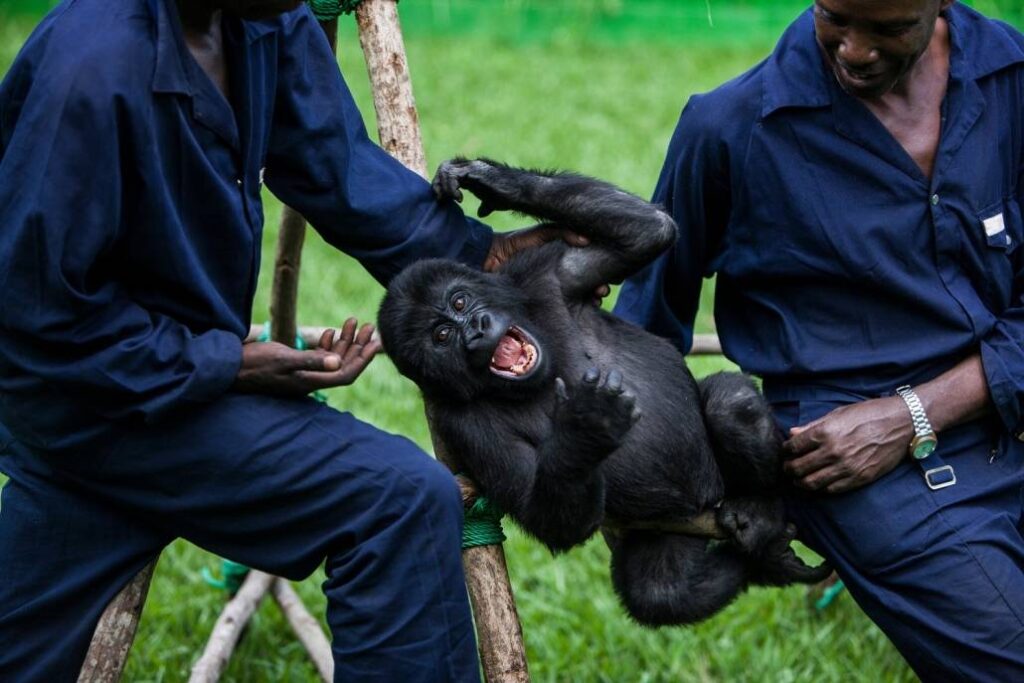Gorilla Poaching In Rwanda
Gorilla Poaching In Rwanda: Although gorilla poaching in Rwanda has largely become a thing of the past or a memory, it is still possible because there are still some poachers and other motivators for this criminal activity. Any wild animal, including mountain gorillas, can be poached and is unlawful, carrying a heavy punishment or possibly life in jail. The most valuable animals to poachers are those that are thought to have high worth or that have a body part that is desirable in the market.

Due to their endangered status and cultural significance, mountain gorillas are frequently the subject of poaching. The fact that mountain gorillas were living in the wild without any protection from conservation organizations made them an ideal target for this horrible behavior in the past.
The female American zoologist and anthropologist Dian Fossey, who became interested in these gentle giants in 1966 and campaigned to stop poaching in favor of Rwanda‘s mountain gorillas being conserved, is largely responsible for the country’s mountain gorilla population’s current state. Rwanda’s mountain gorillas are found at the Volcanoes National Park, which is situated in the nation’s northwest.
Rwanda is home to mountain gorillas, an endangered species that can only be seen or visited in two locations worldwide: the Albertine Rift, which is home to the Democratic Republic of the Congo‘s Virunga national park, Uganda‘s Mgahinga gorilla national park, and Rwanda‘s Volcanoes national park. The Ugandan national park known as Bwindi Impenetrable Forest comes in second.
Since she established a base in the Volcanoes National Park, Dian Fossey has gained a great deal of respect in the region for her efforts to properly study Rwanda‘s mountain gorillas and to further promote conservation efforts. Some of the poachers may have become enraged by the unscrupulous measures employed by Dian Fossey to assure conservation.
After some time, Dian Fossey established the Karisoke Research Center in 1967, which is still operational today to plan for the conservation of mountain gorillas. One of the top research centers in the world for the study and preservation of mountain gorillas is still the Karisoke Research Center.
A handful of the many motivations behind the gorilla poaching in Rwanda, and specifically in the Volcanoes National Park, are enumerated below. The poachers’ primary motivations were selfish ones. There are four main causes of gorilla poaching in Rwanda, however one encouraging development is the recent decrease in poaching incidents.

Where to get bush meat?
While they fed the mountain gorillas and sold their flesh for human use on the illicit market, Rwandan poachers hunted the gorillas down. People paid a lot of money to sample mountain gorilla flesh, making it a very profitable industry. The commotion was caused by the impoverished residents surrounding the park, who had easy access to these creatures.
Mountain gorillas were chased down, slaughtered, and sold since it was thought that their meat was highly excellent and had a market. Occasionally, gorillas would inadvertently become victims of snares placed for other animals, leaving them dead until poachers killed them and sold their meat.
The traditional ways of obtaining money or strength, or of healing, were frequently linked to the poachers. One mountain gorilla would need to be subdued by four adult males, as the gorillas were known for their strength. Witchcraft also involved the use of mountain gorilla body parts, such as ears, tongues, testicles, and fingers, among other body parts.
One of the causes of Rwanda‘s mountain gorilla poaching was the prevalence of these traditional customs and black magic in the region.
In addition, mountain gorillas were kidnapped with the intention of keeping them in captivity. The mountain gorillas were purchased by some zoos to be displayed in zoos across the globe, but they are unable to flourish in confinement. The mountain gorillas would be returned to the wild in the case that they became too frail to be revived after being brought to a zoo, at which point they would perish.
Zoos attempted to replicate the natural environment, but were limited in their ability to replicate the climate and plant life of the wild. A number of gorillas from zoos in North America, Europe, and Asia were targeted, including those in Rwanda.
The same way that killing a powerful animal or one that was revered in the past would earn you respect, those who killed mountain gorillas and retained a memento as a symbol of their valor were respected. In the national park of volcanoes, hunting trips like this one were typical.
Other, less frequent causes of gorilla poaching in Rwanda include resource extraction, which was typical in the Democratic Republic of the Congo, or gorillas being killed by rebel factions during hostilities. Nowadays, it’s normal practice to save gorillas, and you, too, may participate in this on your safari in Rwanda by obtaining a permit to hike with mountain gorillas. A portion of the fee for each permit goes toward conservation efforts. We look forward to hearing from you when you reserve your Rwandan mountain gorilla trekking trip.
